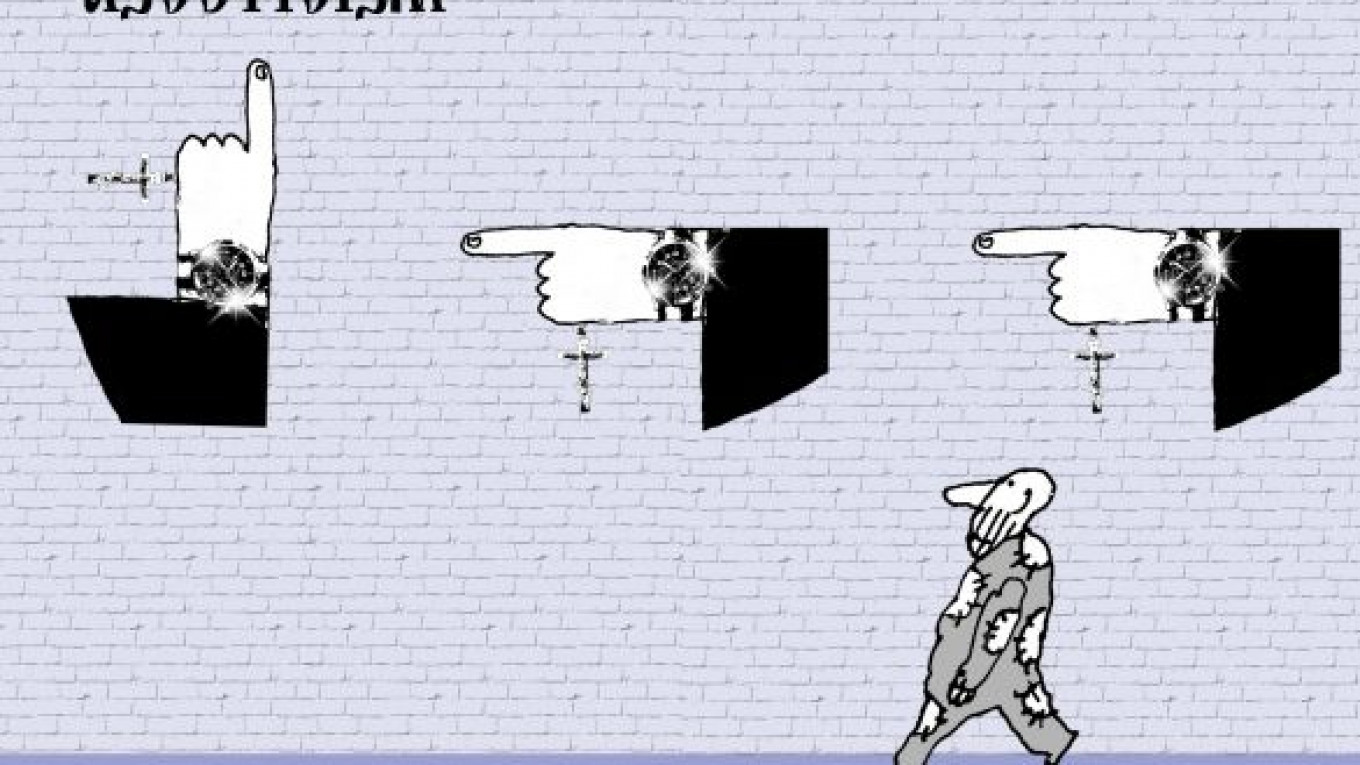Since being enthroned as head of the Russian Orthodox Church, Patriarch Kirill has never gotten much attention from the world press — until last week. Unfortunately, the reason for this attention will give his future biographers a hard time. The patriarch was caught lying.
First, Kirill told television host Vladimir Solovyov that despite what Ukrainian journalists wrote in 2009, he never wore a Breguet watch that is estimated to cost more than $30,000. Then, without much effort, journalist Andrei Malgin found an official photograph on the site of the patriarchate that had the watch neatly photoshopped out. The only problem is that they forgot to airbrush the reflection of the watch on the table.
The patriarchate quickly explained that the photograph had been doctored by an inexperienced 24-year-old employee — a "lay woman," the statement emphasized — without permission. Then the original photograph appeared on the site, with what looks like a Breguet watch on the patriarch's wrist.
Journalist Andrei Loshak wrote on his Ekho Moskvy blog: "It looks like the patriarch indirectly confirmed that he had lied and that he does wear a Breguet. Are they insulting us? In the U.S.S.R., the dissidents who were put away in psychiatric prison hospitals say the hardest thing was staying normal when the norm around you was insanity. That's just how I feel now."
Unfortunately, the scandal over the patriarch's watch isn't the first time that the Russian church bureaucracy has made Orthodox Christians and nonreligious citizens uncomfortable.
For example, Archpriest Vsevolod Chaplin, who is considered to be close to Kirill, suggested introducing a national dress code along the lines of what Ayatollah Khomeini prescribed for Iranian women. Metropolitan Tikhon of Novosibirsk and Berdsk demanded that an exhibition of Picasso engravings opened at the local museum be banned. At a meeting with young people in St. Petersburg, Deacon Andrei Kurayev suggested that they disrupt an upcoming Madonna concert by calling the police and reporting a bomb in the concert hall, which is clearly against the law. And finally, there was the almost unanimous reaction of the church clergy to the Pussy Riot case, which paraphrased Luke 23:21: "Crucify, crucify!"
"The Russian Orthodox Church is trying to interfere more and more often in the private lives of Russian citizens and in purely state matters. This interference is becoming more aggressive," journalist Andrei Kolesnikov noted several years ago on Grani.ru. There are signs that Russians don't like this. They have had to remind the authorities more often than they would like that the Constitution clearly states that Russia is a secular state.
But there is another view about the growing criticism of the church. The church's higher council blamed its problems on those who "promote the false values of aggressive liberalism." Sergei Markov, a former State Duma deputy from United Russia and currently a member of the Public Chamber, supports this conspiracy theory. "This is revenge for the patriarch's indirect support for Putin during the presidential election," Markov told Interfax.
The words "indirect support" are as truthful here as the patriarch's assertion that he never wore a Breguet. It's no secret that during the presidential election, priests openly urged their flocks to vote for Putin in their sermons in many churches throughout the country. Clearly, this could not have been organized without the patriarch's approval.
No one can say how many votes the newly elected president received as a result of the church's support. But it's clear that the church scandals are reducing the number of potential voters who heed church leaders. This might follow the pattern of Poland in 1995, when the ardent Catholic Lech Walesa lost the presidential election because he was too close to the church. The majority of Poles decided that it was "better to be red than black" and voted for a former Communist functionary. In the same way, Putin's close relationship to the patriarchate is gradually becoming more of a liability than an asset.
All that's left is to hope that if church leaders don't comprehend the principles of tolerance and asceticism, then at least they'll have the common sense to stop meddling in affairs unbefitting the clergy. Let's also hope that church leaders start living the way the patriarch has always taught in his sermons: "Asceticism is the victory of man over flesh, over passions, over instinct. And it's important that everyone have this quality — rich and poor alike."
Victor Davidoff is a Moscow-based writer and journalist whose blog is
A Message from The Moscow Times:
Dear readers,
We are facing unprecedented challenges. Russia's Prosecutor General's Office has designated The Moscow Times as an "undesirable" organization, criminalizing our work and putting our staff at risk of prosecution. This follows our earlier unjust labeling as a "foreign agent."
These actions are direct attempts to silence independent journalism in Russia. The authorities claim our work "discredits the decisions of the Russian leadership." We see things differently: we strive to provide accurate, unbiased reporting on Russia.
We, the journalists of The Moscow Times, refuse to be silenced. But to continue our work, we need your help.
Your support, no matter how small, makes a world of difference. If you can, please support us monthly starting from just $2. It's quick to set up, and every contribution makes a significant impact.
By supporting The Moscow Times, you're defending open, independent journalism in the face of repression. Thank you for standing with us.
Remind me later.








